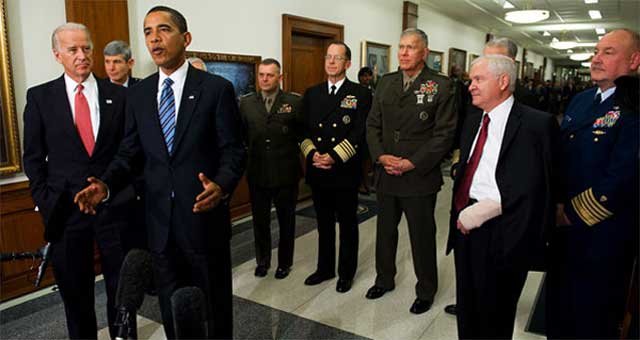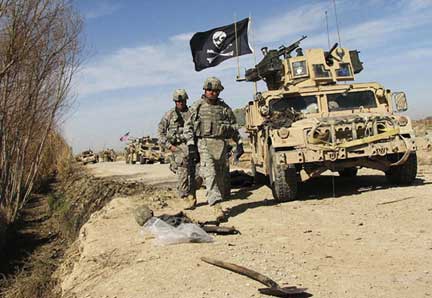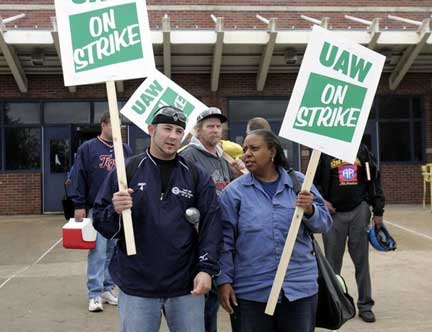
February 2009
U.S. Imperialism Tries a Makeover

President Obama, Vice President Biden with war secretary Gates and Joint Chiefs of Staff at the
Pentagon, January 28. Wall Street Journal considered new war cabinet “not bad.” (Photo: Saul Loeb/AFP)
Forge a Revolutionary Workers Party!
On
January 20, the baton was formally passed
from
George W. Bush to Barack Hussein Obama as
leader of the United States,
the most
powerful imperial power in the history of
the world, presently mired in
losing
imperialist wars and the deepest economic
crisis in three-quarters of a
century. The fact that for the first time
ever, a black person had been
elected
president, was celebrated by well over a
million people who thronged to
the
inaugural in Washington, D.C. and tens of
millions more who watched it
on
television around the U.S. and the world.
For the African American
Obama to
take office in the highest elected position
in this country reflected a
considerable
social change in this country founded on
chattel slavery, where Jim
Crow
segregation continued into the 1960s – and
where in the 21st century
blacks and
Latinos have still been prevented from
voting. But this has not changed
the
system of imperialist capitalism one iota:
with Obama at the helm, the
U.S. is
bombing Iraq and Afghanistan to hell,
marauding in Pakistan, supplying
the
weaponry for Israeli slaughter in Gaza,
throwing millions out of work
in the U.S.
while enslaving workers with starvation
wages around the planet.
The
Internationalist Group did not call for a
vote for
Obama, the candidate of the Democratic
Party, one of the twin parties
of racist
American capitalism, nor do we celebrate his
presidency. Instead, we
called for
a revolutionary workers party and warned of
the illusions that have
been
awakened (with help from the opportunist
left) that the election of the
first
African American president would represent
“change we can believe in,”
as Obama’s
campaign propaganda trumpeted. Our stand was
and is guaranteed to be
unpopular,
for now. Coming after eight years of the
Bush regime, a government born
of a
judicial coup d’état which was hated around
the world and widely
despised even in
the United States, many identified their
hopes with Obama. After a
bitter
election campaign in which Democrat Hillary
Clinton and then Republican
John
McCain and his running mate, the
ultra-rightist Sarah Palin, resorted
to
bigoted appeals, many young people, black
and white, older veterans of
the
Civil Rights movement, white liberals and
Latino and Asian immigrants
hailed
Obama’s victory as a blow against racism.
But Obama in office will
preside over
a racist system.
 Israeli
war crime: Zionist invaders deliberately
targeted Gaza civilian
population. Right: Palestinian man in
anguish over his two sons and
nephew killed by Israeli tank shell on
January 5. (Photo:
Mahmud Hams/AP)
Israeli
war crime: Zionist invaders deliberately
targeted Gaza civilian
population. Right: Palestinian man in
anguish over his two sons and
nephew killed by Israeli tank shell on
January 5. (Photo:
Mahmud Hams/AP)
Inauguration
Day was a huge orchestrated
feel-good celebration
of “inclusion” and “diversity.” TV cameras
focused on signs saying “We
have
overcome” and “Yes, we did.” The Amsterdam
News (17 January), New York’s premier
black newspaper, ran a big
front-page
photo of Martin Luther King, Jr. and the
headline, “The Dream
Realized,”
referring to King’s famous “I have a dream”
speech at the 1963 civil
rights
March on Washington. (Ironically, the
article below it headlined, “Cop
arrested
over shooting of unarmed black man.”) A poll
reported that 69 percent
of the
population thought King’s dream of racial
harmony had been realized.
The New York Times (21
January) proclaimed “a
day of celebration that climaxed a
once-inconceivable journey for the
man and
his country.” It also noted that when the
now-ex president Bush took
off from
the Capitol in a helicopter many in the
crowd gave a farewell Bronx
cheer “along
with some one-fingered salutes.” CNN’s Wolf
Blitzer took a break from
spewing
out a steady diet of Zionist war propaganda
for Israel’s invasion of
Gaza to quote
from a Jamaican woman who said “America can
give itself a couple of
pats on the
back” for electing a black president.
At
his inauguration, Obama proclaimed a “new
era of
responsibility,” hailing “loyalty and
patriotism” and “spirit of
service” embodied
in the soldiers who “patrol far-off deserts”
(Iraq and Afghanistan) and
fought
in places like Khe Sanh (Vietnam). He
referred to the economic crisis
wracking
the U.S., blaming it on the greed of some
and “our collective failure
to make
hard choices” – as if the implosion of the
banking system after years
of
unbridled speculation was also the fault of
working people whose wages
fell
steadily while the Wall Street moguls and
captains of industry wallowed
in
obscene wealth. One commentator dared to
break the reverential praise
to ask of
Obama’s speech, “why did it come out so much
sounding like Ronald
Reagan?” In
fact, Obama has often praised Reagan for
fostering “entrepreneurship”
after “all
the excesses of the 1960s and 1970s” during
which “government had grown
and
grown.” Far from representing “change,”
Obama is firmly in the mold of
Bill
Clinton’s “New Democrats,” who appeal to the
left in primary elections,
run to
the center in the general election and
govern from the right.
Internationally, rulers, media and manufactured popular opinion uniformly greeted the new American president with enthusiasm. In Mexico, even “progressive” intellectuals, generally skeptical of U.S. intentions and actions, were caught up in “Obamamania.” La Jornada (20 January) editorialized that “Obama’s path leads us to believe that he will arrive at the White House with signs of human and social sensibility, of respect for other countries,” unlike his predecessor. Columnists opined that “one must give Barack Obama the benefit of the doubt.” But other Spanish and Latin American writers noted “The Emperor’s Old Clothes” (Carlo Frabetti) and “Imperial Leopardism” (Atilio Borón), from Tomasi di Lampedusa’s novel The Leopard (Il gattopardo) about 19th century Sicily, where “something must change so that everything can stay the same.” The Washington inaugural was watched with special attention in Gaza where many hoped for a statement from Obama with even the slightest criticism of the criminal Israeli bombardment and occupation. Instead, the new president declared that “Israel’s security is paramount” – a virtual endorsement of the massacre of over 1,300 Palestinians, the Zionists’ greeting to their new patron.

Palestinians
in Gaza cafe watch inaugural in Washington.
Many hoped for Obama
criticism of Israel’s
murderous bombing/invasion. But after weeks
of complicit silence the
new U.S. president declared
Israeli “security” is “paramount” –
the same policy as Bush. (Photo: Bruno
Stevens/Cosmos for Newsweek)
Continuity the Ruling
Class Can Count On
While
many liberals and reformist leftists
deluded
themselves into believing that Obama would
provide a break from the
policies of
the past, the Democratic candidate was
careful to commit himself to
very little
– and now he is ripping up his few campaign
promises one after another.
The shift
began with his cabinet appointments,
starting with Rahm Emmanuel, who
volunteered
to work on an Israeli army base during the
1991 Persian Gulf war and
whose
father was a member of the right-wing
Zionist terrorist Irgun.
The new administration is chock full
of
recycled
officials from the Democratic administration
of Bill Clinton, starting
with his
primary rival Hillary Clinton as Secretary
of State. To this was added
a
prominent holdover from the Bush regime,
Robert Gates, as war
secretary. Gates,
a long-time senior CIA official, was up to
his neck in the Iran-Contra
scandal
and the war on Sandinista Nicaragua in the
1980s. Alongside these war
hawks,
Obama’s national security advisor is General
James Jones, the former
Supreme
Commander of Allied Forces Europe, who up to
December 15 was a director
of the Boeing
aircraft and Chevron oil corporations.
“Military-industrial complex”
anyone?
On
the campaign trail and since, Obama
occasionally
indulged in some populist rhetoric, but it’s
just for show. If his
national
security team is loaded with Pentagon brass,
his economic team is top
heavy
with Wall Street execs and members of the
academic-financial axis. Ben
Bernanke
stays on as chairman of the Federal Reserve
Bank, and Timothy Geithner
as
Treasury Secretary will keep on servicing
the big banks as he did for
Bush as
president of the New York Fed, and for
Clinton as a deputy Treasury
secretary.
His bosses then were former Goldman Sachs
CEO Robert Rubin and Larry
Summers (a
devotee of conservative economist Milton
Friedman) who is now head of
Obama’s
Council of Economic Advisors. Rubin and
Summers ditched restrictions
that kept
commercial banks out of investment banking
and deregulated derivatives,
setting
the stage for the orgy of speculation that
triggered the current
crisis. As
candidate, Obama joined McCain in endorsing
the $725 billion bank
bailout, and
as he was about to take office he ordered
Congress to fork over the
second half
of this huge money pot, or else.
No
wonder a Wall
Street Journal (28 November 2008)
editorial praised “Obama’s War
Cabinet”
as “not bad.” In the same issue of the
bankers’ daily, George W. Bush’s
former
Rasputin, Karl Rove, called Obama’s economic
team “reassuring” and
“thanksgiving cheer” for businessmen. A few
weeks later (9 January) the
conservative Journal’s
Washington
commentator Gerald Seib wrote: “Rarely has a
president – to say nothing
of a
Democratic president – been thrown into the
arms of the business
community on
his way in the door as has Barack Obama.”
Ever since the election, the
president-elect went on an offensive to
court Republicans. He consulted
often with
his opponent John McCain, and even had a
private dinner with a gaggle
of right-wing
pundits, one of whom (William Kristol) wrote
a column summing up
Obama’s
“no-dramatic-change-in-policy-in-the-White-House”
line as “continuity we can believe in” (New
York Times, 12 January). Two weeks
later, Kristol published his
last column
for the Times, proclaiming
Obama’s
inauguration “the end of a conservative
era.”
Liberals
are not so sanguine. A writer for
the
Internet magazine Salon (17
January),
David Sirota, headlined “Obama Sells Out to
Wall Street,” adding: “The
president-elect’s support of the bank
bailout is payback to his wealthy
Wall
Street supporters.” He noted that the
Democrat was “a politician who
raised
more Wall Street dough than any other,” and
“whose inauguration
festivities are
being underwritten by the very bankers who
are benefiting from the
bailout
largesse.” Payback, certainly, but Obama can
hardly be accused of
“selling out”
to the money men. Not only is he the
standard bearer of a party that
has been a
pillar of U.S. capitalism since the 1830s,
his campaign was financed
from the
outset by big bucks from high finance, as
well as from well-heeled
Hollywood moguls
and Silicon Valley venture capital. Only a
quarter of the
record-breaking $745
million his presidential campaign raised
came from small donors (New York
Times, 6 January). The first
black president is a vivid demonstration of
how American “democracy” is
government over the working people by the
capitalist politicians and for the
bourgeoisie.
Not
only have the Democratic president’s
personnel
picks and economic policies pleased
conservatives, so have his other
moves.
Notably, Obama stopped talking about
withdrawing U.S. combat forces
from Iraq
in 16 months and now refers to being “on a
glide path to reduce our
forces in
Iraq.” At a mid-December meeting in Chicago
with Obama’s national
security
team, a plan was presented, drawn up by
Bush’s generals Petraeus and
Odierno, that
called only for withdrawing about 5 percent
of U.S. forces (7,000-8,000
troops)
over six months while many units remaining
in Iraq would be
“remissioned” from
combat troops to “trainers” and “enablers.”
Even after the “withdrawal”
some
time in the future, plans are for close
to 50,000 U.S. troops to remain in Iraq
indefinitely according to
Gen.
Odierno (New York Times, 29
January).
Tens of thousands more will be stationed
just over the border in Kuwait
and
other Gulf states, not to mention the
30,000-plus mercenaries and over
100,000
other “contractors” paid for by the U.S..
Obama
has sought to piece off his
liberal/“progressive” supporters with
symbolic gestures like executive
orders to
close the Guantánamo torture prison (a year
from now), and
limiting
interrogation techniques to those in the
Army Field Manual 2-22.3
(which doesn’t
include “waterboarding”). But this only
applies to prisoners captured
in “armed
conflicts” (not “counterterrorism”
operations) and does not include
special techniques
too secret to be made public. Meanwhile,
“extraordinary renditions” of
prisoners to torture regimes will continue
and even increase, as the
U.S. tries
to offload many of the 245 prisoners
presently at Guantánamo. It
is unclear
what will happen to the over 600 prisoners
crammed into even more
gruesome
facilities at the U.S. airbase at Bagram in
Afghanistan, at least two
of whom have
been tortured to death. And Obama has no
intention of prosecuting the
hundreds
of U.S. officers and military personnel
implicated in the torture as
well as
their civilian bosses in the Pentagon and
White House, or the Justice
Department lawyers and top officials who
authorized these war crimes.
The
essential continuity
of Obama’s presidency with that of Bush was
demonstrated in concrete
action
during his first week in office.
- In Afghanistan,
on
January 23, three days after the
inaugural, U.S. Special Forces staged
a raid
in Laghman province, gunning down 16
villagers, including two women and
three
children. After angry protests of hundreds
in the provincial capital,
even the
American satrap installed as Afghan
“president,” Hamid Karzai, demanded
a stop
to such raids, to no avail.
- Across the border
in Pakistan, on the same night as the
Afghan raid, missiles launched
from
remotely controlled U.S. aircraft known as
Predators killed at least 15
people
in the region of Waziristan. Such attacks
were authorized by secret
orders
signed by President Bush last July, and
his successor is continuing
this policy
– a clear act of aggression which the
Pakistani government has
repeatedly
denounced.
- And in Iraq, on
January 25, U.S. Special Operations troops
shot and killed a couple in
their
home near Kirkuk, carrying out this murder
in front of their 8-year-old
daughter.
 Obama
escalates forces in Afghanistan by
almost 50 percent. Shades of the SS:
U.S. troops in Helmand province fly
death’s head flag. (Reuters)
Obama
escalates forces in Afghanistan by
almost 50 percent. Shades of the SS:
U.S. troops in Helmand province fly
death’s head flag. (Reuters)
Since then, Obama
has announced that he is
ordering
17,000 more troops to Afghanistan, an escalation
of almost 50 percent of U.S. forces in
the country. And the future
“withdrawal”
of “combat troops” from Iraq has been
stretched from 16 to 19 months,
with
almost no reductions in 2009, while the
number of “residual forces” to
be stationed
there indefinitely keeps growing.
But
there’s dumb ... and dumber. Bush’s
invasion and
occupation of Iraq has drained U.S. military
and economic strength in a
quest
for world domination. Obama’s vow to
escalate the war in Afghanistan,
spread
over a far larger, mountainous territory,
and at the same time to
attack
Pakistan, with eight times the population
and the only Islamic country
with
nuclear weapons to boot, could set off a
chain reaction that would send
the
entire region up in flames. Any genuine
opponent of imperialism must
break with both capitalist parties and
build a workers party on the
program of
international socialist revolution.
Labor’s Honeymoon with
Obama
While
black, Latino and young voters went
most heavily
for Obama (95 percent, 67 percent and 66
percent respectively), one of
the key
sectors supporting him was organized labor.
Despite racist appeals to
“Joe
Six-Pack,” particularly in key battleground
states like Pennsylvania
and Ohio,
exit polls reported that 59 percent of union
members voted for Obama.
Particularly after the 2000 and 2004
elections, when the Republicans’
“ground
operation” outdid the Democrats’, and eight
years of relentless
anti-worker
action by the Bush regime, labor went
all-out to elect Democrats this
year.
Unions were major financial contributors to
Democratic candidates,
pouring
almost half a billion dollars into their
campaign war chests, and
providing
millions of man and woman hours in phone
banks, campaigning
door-to-door and
other volunteer activities. Contingents from
both the AFL-CIO and
Change to Win
labor federations marched in the Inaugural
Parade. “Happy days are here
again
for the labor movement in the United
States,” wrote the Christian
Science Monitor (2 February) summing
up the views of
labor officialdom.
The
union tops are banking heavily that Obama
will
provide concrete support to labor. They were
ecstatic when the new
president
invited labor leaders to a ceremony signing
three executive orders that
undid
Bush administration policies favoring
employers. Vice-president Joe
Biden
greeted them with the words, “Welcome back
to the White House.” Obama
declared,
“I do not view the labor movement as part of
the problem, to me it's
part of
the solution.” This welcome and verbal
endorsement alone was enough to
ensure
years of support from the bureaucrats, who
above all seek to sell their
services to the ruling class in return for
some “clout” with the
government.
They were full of praise over Obama’s
selection of Democratic Rep.
Hilda Solis
as his new Labor Secretary. And they
applauded his signing of the Lily
Ledbetter Fair Pay Restoration Act
overturning a time limit on suits
against
discrimination imposed by the Supreme Court.
As they dream of a “new
New Deal”
under Obama, many would like to revive a
slogan from the 1930s, “The
president
wants you to join a union.”
In
fact, the incoming administration let it
be known
last month that it wanted the AFL-CIO and
Change to Win to merge into a
single
national labor federation. The leaders of
the 12 largest unions in the
U.S.
dutifully met in Washington to call for
reuniting the labor movement:
“The
union presidents issued their joint call
after the transition team for
President-elect Barack Obama signaled that
it would prefer dealing with
a
united movement, rather than a fractured one
that often had two
competing
voices” (New York Times, 8
January).
The meeting was arranged by former
Democratic Congressman David Bonior.
We did
not support either side in the 2005 split
among the labor tops, nor do
we
expect anything positive from them reuniting
at the behest of the
capitalist
government. Rather, what we’re liable to get
is more protectionist
measures, like
the “Buy American” provision for structural
steel and iron in
infrastructure
projects under the economic stimulus act.
Instead of international
workers
solidarity, United Steelworkers (USW)
president Leo Gerard vituperated
against imports
from China. “It’s time for economic patriots
to stand up in our
country,” said
Gerard, who is Canadian.
 Strikers at Chrysler’s Warren
Stamping Plant, October 2007. UAW
leaders are pushing contract concessions
under government plan to
rescue auto companies which will eliminate
50,000 auto workers’ jobs.
Bailout also includes no-strike provision.
Strikers at Chrysler’s Warren
Stamping Plant, October 2007. UAW
leaders are pushing contract concessions
under government plan to
rescue auto companies which will eliminate
50,000 auto workers’ jobs.
Bailout also includes no-strike provision.
(Photo: Reuters)
United
Auto Workers (UAW) leaders have been
pushing Obama
for the auto “bailout,” under which huge
sums – currently $39 billion
and climbing
– are to be funneled to General Motors and
Chrysler to keep these two
American
industrial giants afloat. Yet these billions
are to be given to the
employers,
not the workers, and will involve huge
“givebacks” by the unions. The
companies
are demanding that they be allowed to
substitute their (presently near
worthless) stock for billions of dollars
they are obligated to pay to
health
care trusts the finance health and
retirement benefits of UAW members.
Already UAW president Ron Gettelfinger has
agreed to give up the “job
bank” which supplemented
unemployment benefits for
laid-off auto workers. The bosses
also want the union to agree to lower labor
costs to the level of
foreign-owned
auto plants in the U.S. (Gettelfinger
already agreed in 2007 to cut
wages for new
hires to $14.50 an hour, half the level of
current employees). Some 50,000
auto workers’ jobs are to be
eliminated under this “rescue” plan,
which also turned out to have
an
unpublicized no-strike clause.
But
what do the UAW bureaucrats care, they have
no intention of striking to
defend
their members.
The
Service Employees International Union
(SEIU) led
by Andrew Stern has been a long-time
supporter of Obama in Illinois,
and
endorsed him for president in early February
2008, long before the
AFL-CIO,
many of whose affiliates initially supported
Hillary Clinton. Stern
brags that
the union spent $82 million electing
Democrats in 2008. The SEIU’s
preference
for Obama is not accidental, since Stern’s
calling card is
“partnership”
between unions, employers and the
government. The SEIU chief posed as a
“reformer” and has put resources into union
organizing campaigns while
the
hidebound AFL-CIO chiefs prefer to spend
their time hobnobbing with
Democratic
politicians on Capitol Hill. But Stern has
also formed alliances with
such
virulent labor haters as Wal-Mart (over
health care) and the colonial
government of Puerto Rico (against the
militant FMPR teachers union).
Stern
runs the SEIU as his personal fiefdom, and
has gone to the capitalist
state to
oust dissidents in the union, recently
against California health care
workers.
He is also a virulent defender of the
present bankrupt economic system,
saying
“I totally believe that America should be
focused on capitalism and
competition”
(CNN, 31 January).
Above
all, labor officialdom is pinning its
hopes on
Congress passing and Obama signing into law
the Employee Free Choice
Act (EFCA).
Under this bill (H.R. 800), unions would be
recognized on the basis of
a “card
check” if at least 50 percent of the
employees in a company or location
sign
cards affiliating to a union as their
representative. The union tops
hope that
this would turn around decades of declining
membership. They figure a
card
check would make organizing a lot easier
since they wouldn’t have to go
through
a stacked union “election” under the
National Labor Relations Board
(NLRB). At
present, employers brazenly intimidate
employees, threatening to close
the
workplace, barring union organizers from the
plant and firing union
sympathizers with abandon. The NLRB, deeply
hostile to unions, seldom
reinstates workers in their jobs, and it
routinely takes years for
cases to be
decided. But while a card check may aid
union organizing, the EFCA
still
asserts the government’s right to certify
union representation. Or not.
In
addition, it includes a provision for compulsory
arbitration of an initial two-year
contract if the employer and
union
cannot reach an agreement.
Liberals
and reformist leftists who pursue
the illusion
of making the capitalist system more
“worker-friendly,” are universally
in
favor of the EFCA. How effective it would be
in increasing union
membership in
the face of an employer class that has made
union-busting into a $4
billion
industry is another matter. Canada has a
card check law and only 17
percent of
the private sector workforce is unionized
(as opposed to 7.5 percent in
the
U.S.). But we have a more fundamental
difference. Marxists
oppose all interference by the capitalist
government in union
affairs, and warn that the EFCA can be
used to hamstring militant
action by
labor. We’re for getting rid of all
obstacles to unionization, such as
the requirement
for stacked NLRB elections. We participate
in union mobilizations in
opposition
to the employer offensive against the “card
check” bill. But rather
than
calling to support the EFCA, we fight for
full freedom of workers to
organize and
for total independence of the unions from
state control. As Leon
Trotsky wrote
in his 1940 essay, “Trade Unions in the
Epoch of Imperialist Decay”:
“The
primary slogan for this struggle is: complete
and unconditional independence of the
trade unions in relation to the
capitalist
state.” ■
See
also: Why
Marxists Oppose All Government
Intervention in the Unions
(23
February 2009) 
The
“Obama
Socialists”
(23
February 2009) 
Not a “New
New Deal,” But a
Transitional Program for Socialist
Revolution
(23
February 2009) 
Barack
Obama
vs. Black Liberation
(23
February 2009) 
To contact the Internationalist Group and the League for the Fourth International, send e-mail to: internationalistgroup@msn.com